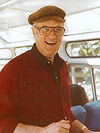October 9, 2007 - By Mitzi Baker

Duncan Govan
Duncan Govan, MD, PhD, professor emeritus of urology, died Sept. 28 at the age of 84 after a prolonged illness. Shortly before his death, he had entered the health center at the Sequoias in Portola Valley.
Govan, one of the original faculty of Stanford's School of Medicine when it moved from San Francisco to Palo Alto, served two stints as acting chief of staff at Stanford Hospital and was known as a great humanitarian, educator and advocate for students and junior clinicians.
When Linda Shortliffe, MD, the current chair of urology, arrived as an intern fresh out of medical school in 1975, Govan was one of four faculty members in the department. She was immediately impressed. 'He was really quite a tall man - he must have been 6-foot-4 or so - but for all his stature, he was really gentle,' she said. 'He had a humanitarian outlook on all things and was a model for any physician.'
Shortliffe recalled the dichotomy between the serious, technical surgeon that Govan was in the operating room, and the warm, generous person whom people knew outside. 'He told me that one of the things he loved doing when he was chief of staff was to serve ice cream at an annual nurses' day,' she said. 'This side of him just loved creating a good time for people.'
Robert Kessler, MD, professor of urology, said when he arrived at Stanford in 1973 as 'a real novice,' Govan went out of his way to make him feel comfortable.
Kessler recalled Govan's mentorship for the residents and junior faculty and how he treated doctors-in-training with the utmost respect. 'When residents were getting chastised by other faculty, he would always step in and try to mitigate the complaints so as to divert some of the criticism,' Kessler said. 'I will always remember him as a true gentleman, always kind and thoughtful and thinking of other people's feelings.'
Christos Constantinou, PhD, recalled Govan's dedication to his patients, many of whom were children. 'Always sensitive to the concerns of the family, he devoted many hours interacting with parents explaining the child's problems and the consequences of treatment,' said Constantinou, associate professor of urology.
Govan was born in Winnipeg, Manitoba, Canada in 1923. He earned his MD from the University of Manitoba in 1948 and spent three years there in a general surgery residency, followed by a year in gynecology. In 1954, he moved to the University of Chicago for a urology residency. While there, he obtained his PhD in renal physiology in 1956.
In 1958, he moved to Vancouver, British Columbia, where he worked with a urology group for three years. He was awarded a National Research Council grant, allowing him to return to research, until he came to Stanford.
In 1959, when the medical school moved to Palo Alto, few physicians made the move, so entire clinical departments were staffed from scratch. In 1961, Govan was invited to join the new chief of the division, Thomas Stamey, MD, as a professor of urology.
Although Govan was a general urologist, his main expertise was in pediatric urology. Many of his investigations were in the field of neurophysiology of the bladder and the upper urinary tract.
In addition to his clinical work and research, Govan instituted several teaching and education programs. He began seminars to keep local urologists up to date on research. As chair of the medical school's curriculum committee from 1977-80, Govan co-developed a research program to encourage medical students to enter the field of biological research with guidance of a faculty mentor.
Among the honors he received from the medical school were the Kaiser Award for Education and the Rambar Award for Excellence in Patient Care.
In 1988, Govan moved to emeritus status. He saw patients until 1993, and came back to duty as deputy chief of staff of Stanford Hospital from 1989 through 1992. He served as acting chief of staff in 1992, and again in 1995-96.
In 1992, he founded a RotaCare free medical clinic in East Palo Alto, begun with $8,000 in donations from local Rotary Clubs and supplies from Stanford Hospital. He was medical director for 10 years
'We will miss him as a clinician, as a researcher and truly as an advocate for residents and junior faculty,' said Shortliffe, 'but mainly as a truly wonderful human being.'
Govan is survived by his wife, Eileen Patricia, of Portola Valley, six children and many grandchildren. A celebration of his life is planned for Nov. 30. For more information, contact Stephanie Edelman at 723-6852 or sedelman@stanford.edu.
About Stanford Medicine
Stanford Medicine is an integrated academic health system comprising the Stanford School of Medicine and adult and pediatric health care delivery systems. Together, they harness the full potential of biomedicine through collaborative research, education and clinical care for patients. For more information, please visit med.stanford.edu.